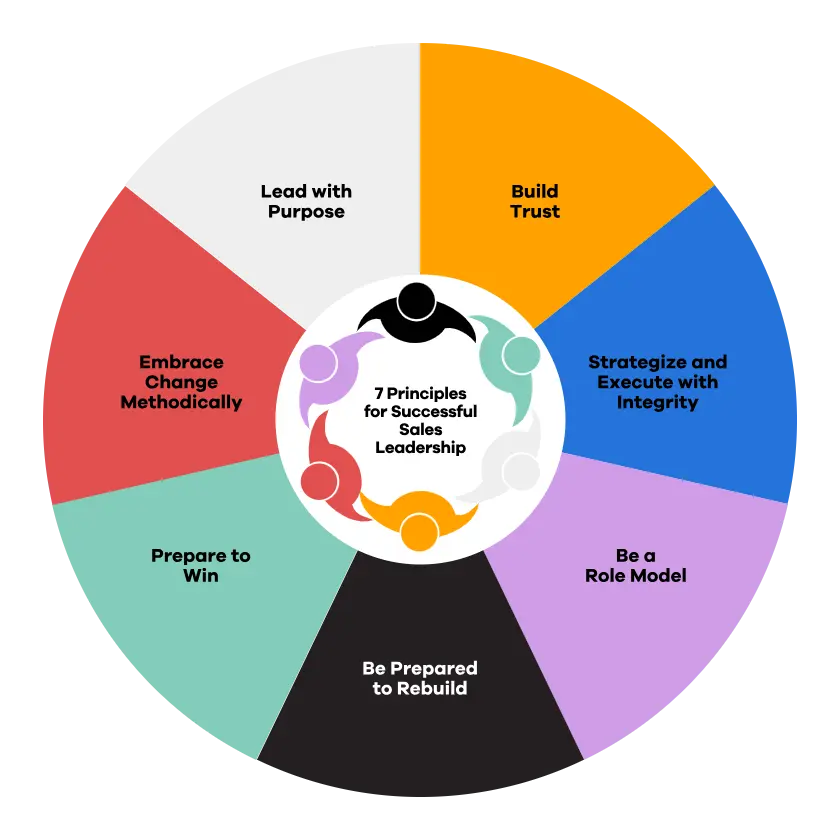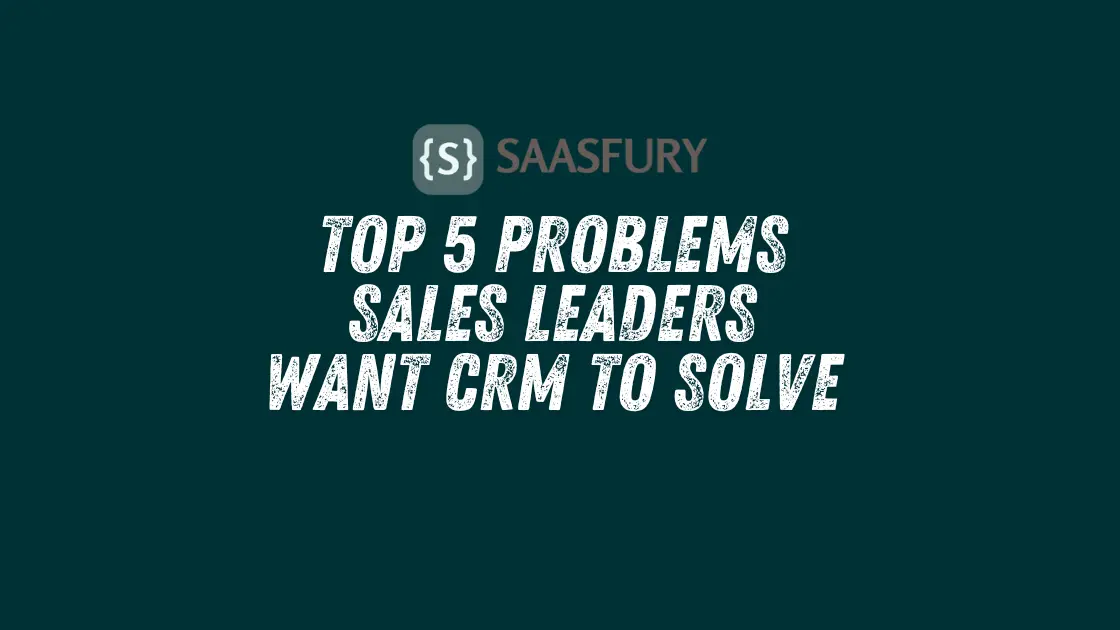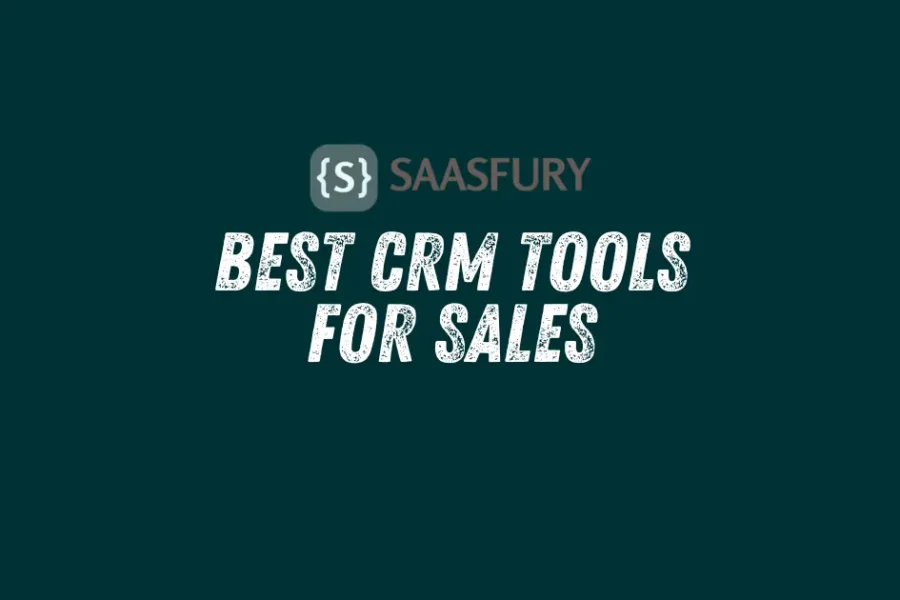Sales leaders want CRM to solve lead management, sales forecasting, customer insights, collaboration, and reporting issues. Effective CRM tools streamline these processes.
Sales leaders face numerous challenges in managing their teams and meeting targets. They require efficient tools to handle lead management, sales forecasting, customer insights, collaboration, and reporting. A robust CRM system addresses these issues by organizing leads, providing accurate sales forecasts, offering valuable customer insights, enhancing team collaboration, and simplifying reporting.
By solving these key problems, a CRM system helps sales leaders improve productivity, make informed decisions, and ultimately drive revenue growth. Investing in a CRM tailored to these needs is crucial for any sales organization aiming for success in a competitive market.
Table of Contents

Credit: uplandsoftware.com
Lead Management
Lead management is crucial for sales leaders. Effective tracking and prioritization of leads is made possible by it. Effective lead management guarantees that no potential customer is overlooked. It also helps in making the sales process efficient and productive.
Lead Tracking
Lead tracking lets sales teams monitor every interaction with a potential customer. This includes emails, calls, and meetings. Keeping a detailed record helps in understanding customer behavior. It also aids in personalizing future interactions. A CRM system simplifies this process.
Here are some key features for effective lead tracking:
- Automatic logging of communications
- Real-time updates
- Customizable dashboards
- Integration with email and social media
Lead Scoring
Lead scoring helps in prioritizing leads based on their potential to convert. It assigns scores to leads based on certain criteria. These criteria could be demographics, behavior, or interaction history. A higher score indicates a higher chance of conversion.
Benefits of lead scoring include:
- Efficient use of sales resources
- Improved conversion rates
- Better alignment between sales and marketing
Here’s how a CRM helps with lead scoring:
| Feature | Benefit |
|---|---|
| Automated scoring | Saves time and reduces errors |
| Customizable criteria | Matches your unique business needs |
| Real-time updates | Ensures accurate and current scores |
Sales Forecasting
Sales forecasting is crucial for any sales leader. It helps predict future sales, manage resources, and set realistic targets. With the right CRM, sales leaders can achieve accurate forecasts and make informed decisions.
Accurate Predictions
Accurate predictions are vital for a company’s growth. A CRM can analyze historical data and predict future trends. This helps in planning resources and setting achievable targets. Sales leaders rely on these predictions to make strategic decisions.
A CRM with advanced analytics can offer better insights. It can identify patterns and provide accurate forecasts. This reduces the risk of overestimating or underestimating sales.
Pipeline Analysis
Pipeline analysis is another critical aspect of sales forecasting. A CRM can track every stage of the sales pipeline. This helps in identifying bottlenecks and optimizing the sales process.
With a clear view of the pipeline, sales leaders can prioritize leads. They can focus on high-potential deals and allocate resources efficiently. This ensures a steady flow of opportunities and higher conversion rates.
| Pipeline Stage | Action Required |
|---|---|
| Lead Generation | Identify potential leads |
| Qualification | Assess lead quality |
| Proposal | Create compelling offers |
| Negotiation | Finalize deal terms |
| Closure | Seal the deal |
Customer Insights
Sales leaders need deep customer insights to make better decisions. Customer insights help understand behavior, preferences, and needs. This leads to more targeted and effective sales strategies.
Behavior Analysis
Behavior analysis tracks customer actions and interactions. It identifies patterns and trends in customer behavior.
- Website visits
- Email opens
- Purchase history
Using this data, sales leaders can predict future actions. This helps create personalized marketing campaigns. Behavior analysis increases customer engagement and loyalty.
Segmentation
Segmentation divides customers into specific groups. These groups are based on shared characteristics. Examples include:
- Demographics
- Purchase behavior
- Geographic location
Segmentation helps tailor marketing messages to each group. It ensures relevance and increases conversion rates. Segmentation also identifies high-value customers for special offers.

Credit: yoursales.com
Team Collaboration
Sales leaders face numerous challenges, but improving team collaboration tops the list. Effective collaboration boosts productivity and ensures seamless customer experiences. Here, we explore two key aspects: Communication Tools and Shared Data.
Communication Tools
A CRM should offer efficient communication tools to enhance team collaboration. These tools help teams stay connected and informed. Real-time messaging and integrated email systems are crucial features. They ensure everyone receives updates promptly.
Consider the following essential communication tools in a CRM:
- Instant Messaging
- Email Integration
- Video Conferencing
- Task Assignments
| Tool | Benefit |
|---|---|
| Instant Messaging | Real-time communication |
| Email Integration | Centralized email management |
| Video Conferencing | Face-to-face meetings |
| Task Assignments | Clear responsibilities |
Shared Data
Another critical aspect is shared data. A good CRM allows team members to access the same data. This guarantees that all team members are in agreement, resulting in improved decision-making.
Key benefits of shared data include:
- Improved transparency
- Enhanced data accuracy
- Faster problem resolution
Shared data also helps in tracking customer interactions. It provides insights into customer behavior and preferences. This information can be used to tailor customer approaches.
A CRM with robust data-sharing capabilities empowers sales teams. It fosters a culture of collaboration and trust.
Performance Metrics
Sales leaders need clear performance metrics to guide their teams. They use Customer Relationship Management (CRM) tools to track these metrics. Performance metrics give insights into sales processes and team efficiency.
KPI Monitoring
Key Performance Indicators (KPIs) are crucial for sales success. Sales leaders rely on CRM systems to monitor KPIs. These indicators help evaluate individual and team performances.
- Sales Growth: Tracks revenue increase over a period.
- Customer Acquisition Cost: Measures the cost of gaining new customers.
- Lead Conversion Rate: Shows the percentage of leads that become customers.
- Churn Rate: Indicates the percentage of customers lost.
CRM systems provide real-time data on these KPIs. This data helps sales leaders make informed decisions. It also helps in identifying areas needing improvement.
Goal Setting
Setting clear goals is essential for sales teams. CRM tools assist in defining and tracking these goals. Goals can be set for individuals or the entire team.
Some common sales goals include:
- Monthly Sales Targets: Amount of revenue to be achieved each month.
- Quarterly Growth Goals: Expected growth over a quarter.
- Customer Retention Targets: Aim to keep a certain percentage of customers.
- Lead Generation Goals: Number of new leads to acquire.
CRM systems help track progress towards these goals. They provide alerts and updates, ensuring the team stays on track.

Credit: blog.hubspot.com
Automation
Automation significantly transforms the role of sales leaders. It streamlines processes and boosts productivity. By automating repetitive tasks, sales teams can focus on closing deals and building relationships. Here, we explore how CRM automation solves key problems.
Task Automation
Task automation eliminates manual data entry. Sales reps spend more time selling. CRM systems can automatically log calls, send follow-up emails, and update records. This ensures data accuracy and saves precious hours.
- Automated call logging
- Follow-up email reminders
- Record updates
Automated reminders ensure no lead is forgotten. Sales reps receive notifications for follow-ups. This boosts conversion rates and improves customer relationships.
Workflow Efficiency
Workflow efficiency is crucial for a high-performing sales team. CRMs streamline workflows by automating approval processes, lead assignments, and task prioritization.
- Automated approval processes
- Lead assignments
- Task prioritization
Automated lead assignments ensure leads go to the right reps. This speeds up response times and improves lead management.
Task prioritization helps reps focus on high-value activities. Automated task lists ensure reps tackle the most important tasks first. This boosts productivity and improves sales performance.
Data Management
Data management is a crucial aspect for sales leaders. Accurate data helps in making informed decisions. Efficient data management in CRM systems ensures smooth operations and better customer relations. Sales leaders often struggle with data integration and data accuracy. Let’s dive into these common issues.
Data Integration
Data integration is vital for a unified customer view. Sales leaders need all customer data in one place. This includes data from emails, social media, and past transactions. Integrating diverse data sources is challenging but essential for effective CRM.
Key benefits of data integration:
- Improves customer insights
- Enhances customer service
- Streamlines sales processes
Challenges in data integration:
- Handling different data formats
- Ensuring data consistency
- Dealing with legacy systems
A well-integrated CRM system saves time and reduces errors. It also helps in making better business decisions.
Data Accuracy
Data accuracy is another major concern for sales leaders. Incorrect data leads to poor customer interactions and missed opportunities. Accurate data ensures that sales teams have the right information at the right time.
Importance of data accuracy:
- Builds customer trust
- Enhances decision-making
- Improves sales forecasting
Steps to ensure data accuracy:
- Regular data audits
- Standardizing data entry processes
- Using automated data validation tools
Accurate data in CRM systems enhances customer relationships. It also boosts sales efficiency and productivity.
Customer Retention
Customer retention is vital for sustained business growth. Sales leaders need a CRM to help keep customers engaged. CRM systems offer tools to boost customer loyalty and satisfaction.
Loyalty Programs
Loyalty programs encourage repeat business. A CRM can track customer purchases. It helps design personalized rewards for loyal customers.
- Points System: Customers earn points for each purchase.
- Tiered Rewards: Higher spending unlocks better rewards.
- Exclusive Offers: Special deals for loyalty members.
These features make customers feel valued. They are more likely to return and buy more.
Feedback Management
Listening to customer feedback is essential. A CRM can collect and organize feedback. This helps in understanding customer needs.
- Surveys: Send questionnaires to gather opinions.
- Reviews: Monitor and respond to online reviews.
- Complaints: Address complaints quickly and effectively.
Effective feedback management improves customer satisfaction. Happy customers are more likely to stay loyal.
Frequently Asked Questions
What Are Common CRM Problems for Sales Leaders?
Sales leaders often face issues like data management, lead tracking, and integration challenges. These problems can hinder sales productivity. Efficient CRM systems address these issues, streamlining processes and boosting team performance.
How Does CRM Improve Lead Tracking?
CRM systems offer tools for efficient lead tracking. They capture, organize, and manage leads effectively. This ensures that no lead is overlooked. Sales teams can prioritize and follow up on leads promptly, improving conversion rates.
Why Is Data Management Crucial in CRM?
Effective data management is crucial for accurate insights. CRM systems help manage vast amounts of sales data. This ensures data accuracy and accessibility. Sales leaders can make informed decisions based on real-time, reliable data.
Can CRM Systems Integrate With Other Tools?
Yes, modern CRM systems offer seamless integration. They connect with marketing automation, email, and other business tools. This integration enhances workflow efficiency. It ensures that all sales activities are synchronized and streamlined.
Conclusion
Sales leaders face significant challenges that a CRM can solve. Efficient CRM tools can improve team productivity and customer relationships. By addressing common pain points, CRM systems offer valuable solutions. Prioritizing these tools will drive better sales results and enhance business growth.
Implement the right CRM to overcome these challenges effectively.







Leave a Comment